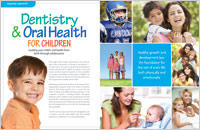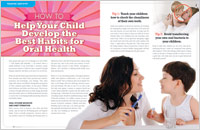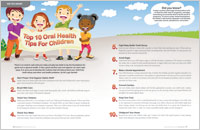Your child won't keep his or her first teeth forever, but that doesn't mean those tiny pearly whites don't need conscientious care. Maintaining your child's dental health now will provide health benefits well into adulthood, as primary (baby) teeth serve some extremely important functions.
For one thing, primary teeth serve as guides for the eruption of permanent (adult) teeth, holding the space into which these new teeth will erupt. The crowns (tops) of the permanent teeth actually push against the roots of the baby teeth, causing them to reabsorb, or melt away. In this way, the adult teeth can take their proper place.
What's more, your child's primary teeth will be there for most of childhood, helping your child to bite, chew and speak. For the first six or so years, he or she will be relying on primary teeth exclusively to perform these important functions. Until around age 12, your child will have a mix of primary and permanent teeth. You will want to make sure those teeth stay healthy and are lost naturally — when it's time.
Your Child's First Teeth
Your child's 20 baby teeth will begin to appear usually between six and nine months, though in some cases it may start as early as three months or as late as twelve months. The two lower front teeth tend to erupt first, followed by the two upper ones. The first molars come in next, followed by the canines (eyeteeth). Sometimes your baby can experience teething discomfort during this process. If so, there are courses of action to help make your child more comfortable.
Your Child's First Dental Appointment
The American Academy of Pediatric Dentistry recommends that your child see a dentist when the first tooth appears or no later than his/her first birthday. Though this may sound early, learning proper pediatric oral hygiene techniques, checking for cavities, and watching for developmental problems is extremely important. Dr. “Colleen” will determine your child’s risk for developing cavities and provide you with tools specifically tailored to your child’s needs.
There are a number of forms of tooth decay that can affect babies and small children. Early Childhood Caries (tooth decay) can develop rapidly, progressing from the hard, outer enamel layer of a tooth into the softer, inner dentin in six months or less. If detected early, there may be interventions available to delay or even eliminate the need for a traditional filling.
Most of all, it's important for your child to have a positive experience at the dental office as he/she will be a regular visitor for years to come.
Pediatric Dental Services
There are a variety of dental treatments offered to prevent tooth decay in children, and to restore teeth when necessary. They include:
Examinations and X-rays - The examination consists of a thorough review of your child’s medical history. It is important that we be made aware of any medical conditions or allergies. The dental exam will consist of an extra-oral (head and neck exam) and an intra-oral (mouth) evaluation to determine the health of your child’s teeth, gums, and their overall jaw alignment. Digital X-rays provide the ability to diagnose problems with teeth or the supporting bone that often can not be viewed by an exam alone.
Cleanings/Oral Hygiene Instructions/Diet Counseling - Cleanings are done to remove plaque and tartar from tooth surfaces. At the same visit we will discuss preventive measures including oral hygiene instructions and diet modifications which can help to improve/maintain your child’s oral health.
Topical Fluoride - Fluoride incorporates into the enamel of teeth, making it harder and more resistant to decay. Although there is a small amount of fluoride in toothpaste and in some drinking water supplies, a higher concentration can be applied professionally to your child's teeth for maximum protection.
Silver Diamine Fluoride - This is a fluoride medicament application which has antibacterial properties. It can be applied to some cavities in instances where traditional methods may not be an option.
Dental Sealants - A plastic coating can be applied at the dental office to prevent cavities by sealing the little grooves on the chewing surfaces of back teeth known as “pits and fissures.” These little crevices become the perfect environments for decay-causing bacteria. Immature tooth enamel is more permeable and therefore less resistant to tooth decay. Dental sealants are easy to apply and provide years of protection ( Watch Dental Sealant Video ).
Fillings - We offer many different fillings options to best suit your child’s specific need. These include resin (white fillings), glass ionomer (white fillings with fluoride), and amalgam (silver fillings). The location and severity, as well as your child’s risk for tooth decay often help us to decide which material will work best for them.
Nerve Therapy (Pulpotomy/Pulpectomy) - There are instances when the nerve of a tooth has been injured either by trauma or from severe decay and requires either partial or complete removal. As mentioned above, baby teeth are important guides to the permanent teeth that are already forming beneath your child's gums. Therefore, saving them from premature loss can help prevent a malocclusion (“mal” – bad; “occlusion” – bite) that requires orthodontic treatment.
Stainless Steel Crowns - These are silver colored caps for baby teeth that are often reserved for instances where a tooth is fractured or decayed beyond the point of which a filling would be adequate. They are often placed following nerve therapies and in children who are at high risk for developing cavities.
Extractions - There are instances when teeth are damage from trauma, decay, are over-retained, or causing alignment issues and are therefore indicated to be removed.
Nitrous Oxide Analgesia (“Laughing Gas”) - This is an in-office service that is administered through a scented nose and can help to decrease anxiety for children while receiving dental treatment.
Hospital Dentistry - There are instances where children would be best served by receiving oral rehabilitation under general anesthesia. We provide this service at St. Christopher’s Hospital for Children in Philadelphia, PA.
Space Maintainers - If a baby tooth is lost prematurely, a space maintainer may be indicated in order to maintain the space for the successor (permanent) tooth to grow into its place.
Orthodontic Concerns
At each visit we will be monitoring your child’s dental growth and development. There are many orthodontic problems that can be detected at a young age and there are times when seeing an orthodontist early is necessary.
Sports & Your Child's Teeth
If your child is active in sports, a custom-made mouthguard is a highly recommended safeguard. According to the American Dental Association, an athlete is 60 times more likely to suffer dental harm when not wearing one of these protective devices. A custom mouthguard is made specifically for your child using a model of his or her teeth. This will offer greater protection than an off-the-shelf model. It's an investment that pays off highly in the form of reduced pain, suffering — and dental expenses down the road!
Related Articles

Dentistry and Oral Health for Children Dear Doctor magazine brings you this wide-ranging overview of milestones and transitions in your child's dental development. Learn how to protect your children from tooth decay, dental injuries, and unhealthy habits while getting them started on the road to a lifetime of oral health and general well-being... Read Article

Pregnancy & Oral Health Pregnancy is generally thought of as the time when a woman strives to be particularly aware of the need for better health. Many women, though, may not be aware of the link that exists between their oral health and their systemic (general) health, as well as the impact this can have on a developing child. Learn about how to care for yourself and your baby... Read Article

How to Help Your Child Develop the Best Habits for Oral Health Proper oral health habits are easy to learn — and lead to behaviors that result in lifelong dental health. And the time to begin is as soon as your child's first baby teeth appear. From toothbrushing for your toddler to helping your teenager stay away from tobacco, Dear Doctor magazine offers the most important tips for healthy habit formation through childhood and beyond... Read Article

Top 10 Oral Health Tips for Children There's no need to wait until your baby actually has teeth to lay the foundations for good oral or general health. In fact, good nutrition and oral hygiene can start right away. It is up to you to develop the routines that will help protect your child from tooth decay and other oral health problems. So let's get started... Read Article




